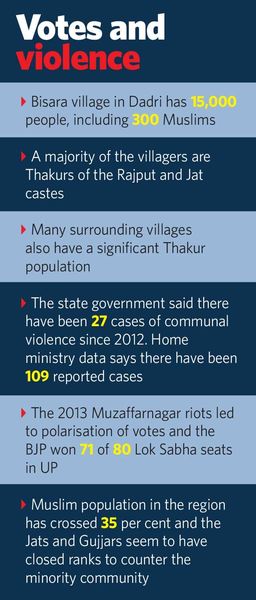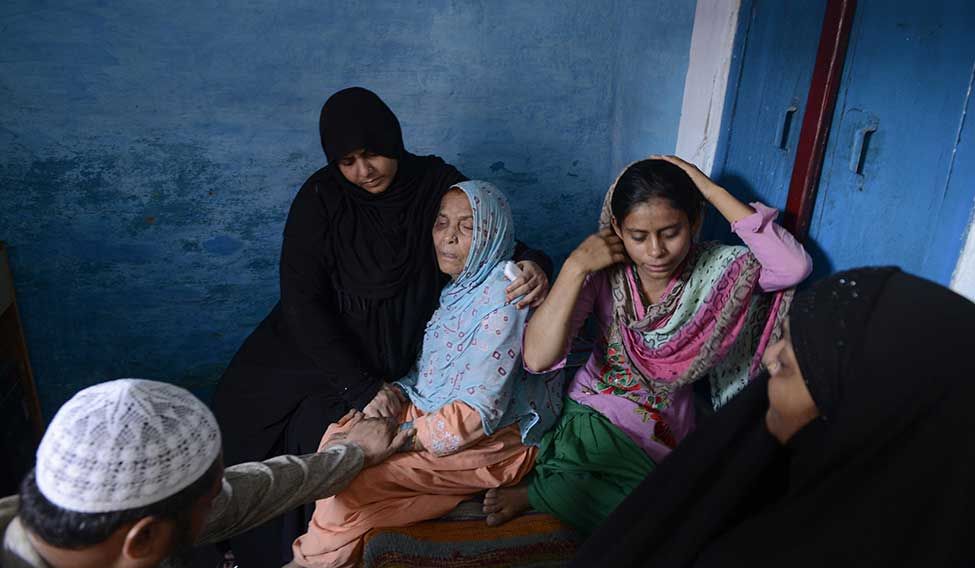The punishment for killing a cow in Uttar Pradesh is imprisonment up to two years and a fine of Rs.1,000. Mohammad Akhlaq, however, got the death penalty. No, a court did not sentence him; he was lynched by a 200-strong mob on the night of September 28. He and his family had allegedly slaughtered and eaten a calf. The family, however, said it was mutton and samples were sent for forensic testing.
Bisara, the village in Dadri, in western UP, is now on the boil. Beneath an uneasy calm, enforced by the massive deployment of paramilitary forces, the village is seething. A swarm of politicians has descended on the place, ostensibly to assuage the victim's family. The villagers are furious with both the politicians and the media. But, as they couldn't stop the heavily guarded leaders, they attacked the journalists. The residents of the Hindu-dominated village have a beef with the media—they said the media showed only Akhlaq’s side of the story.
Akhlaq, 52, eked out a living as a farm worker and looked after his mother Asgari, brother Afzal, daughter Shaista, and sons Sartaj and Danish. Danish was seriously injured in the attack.
Some of the villagers THE WEEK spoke to said the attack followed a loudspeaker announcement from the village temple that Akhlaq and his family had slaughtered and eaten a calf. The following day, many villagers gathered to demand death penalty for the people who killed the calf. As violence broke, the police opened fire to dispel the crowd and a bullet hit Rahul Yadav, a local youth, in the hip. The villagers said most of the politicians who visited Akhlaq's home did not visit Rahul, at least not initially. They said that while Akhlaq’s story was flashed all over, the media remained silent about police excesses during the interrogation of the 18 youths they took into custody. By October 3, the police had arrested the 10 people named in the first information report. One of them, Vishal Rana, is the son of local BJP leader Sanjay Rana, and six others are reportedly related to them.

A political blame game followed the lynching. Parties looking to garner support in the panchayat elections, starting on October 9, have been using Dadri as a platform. The UP assembly elections, too, are not far off.
Mahesh Sharma, Union culture minister, who was elected to Parliament from this area, was the first to reach the spot of the murder. “Akhlaq’s lynching was not pre-planned,” he said, trying to play it down. “It appears to be an accident. It occurred because of some misunderstanding.”
The ruling Samajwadi Party sent Azam Khan, a senior minister in the Akhilesh Yadav government. “The BJP is trying to engineer mass killings before the 2017 assembly polls,” he said. “The BJP wants to do so because it was successful after the 2013 Muzaffarnagar riots.” (Sixty people were killed in the riots, and the BJP won 71 of 80 Lok Sabha seats in the state in 2014.)
Also, Khan wrote to United Nations Secretary-General Ban Ki-moon, urging him to prevent the saffron forces from converting India into a “Hindu nation”.
The Bahujan Samaj Party blamed the Akhilesh government more than the BJP. Said BSP president Mayawati: “The Akhilesh government is more responsible than the anarchical elements of the RSS and the BJP. The government has failed to rein in anti-Muslim forces in the state.”
The state government announced a compensation of Rs.10 lakh for the victim’s family. But, the situation became more tense after visits from Congress vice president Rahul Gandhi, Communist Party of India (Marxist) leader Brinda Karat and All India Majilis-e-Ittehadul Muslimeen president Asaduddin Owaisi. To keep the situation under control, Akhilesh put Samajwadi Party leader Ashu Malik on the job. Malik met Akhlaq’s family and quietly flew them into the state capital. Soon after, the government increased the compensation to 045 lakh and Akhilesh issued a guarded statement: “Justice will be done to the family and those involved in the incident will be punished severely.”
The village of 15,000 people has only 300 Muslims. Most of the villagers are Thakurs belonging to the Rajput and Jat castes. Many of the surrounding villages also have a significant Thakur population. BJP MLA Sangeet Singh Som, a Thakur himself, visited the village and spoke at length about hindutva. Som had been accused of instigating the Muzaffarnagar riots through his inflammatory speeches. However, he was welcomed warmly by many of the villagers. “I want to tell him [Owaisi] that this is UP, not Hyderabad,” he told THE WEEK. “Those involved in cow slaughter will be opposed at every cost.”
Owaisi, too, seems to have a clear goal. “Akhlaq was killed not because of maans (meat), but because of mazhab (religion),” he said. The AIMIM will field candidates in 24 districts in the panchayat polls and is gauging the pulse before the assembly elections.
The state government has admitted that, since it came to power in 2012, there have been 27 cases of communal violence. According to home ministry data, however, the number of reported cases is 107. Social and political observers said the recent spurt in communal violence could be because of the change in demography. “Recent census data shows that the Muslim population in the region has crossed 35 per cent,” said a social worker. “This has changed the social fabric at the ground level and the dominant Jats and Gujjars appear to have closed ranks to counter the dominance of the minority community.”
The Jats and Gujjars have traditionally supported the Ajit Singh-led Rashtriya Lok Dal and Mayawati's BSP. Both communities, however, voted for the BJP in the last Lok Sabha elections.
With Akhlaq gone, his family has decided to move out of the village. His son, Sartaj, a corporal-rank technician in the Air Force, told THE WEEK: “We do not feel safe in the village anymore. This is not the murder of my father, but the murder of our faith and trust. Those who have been arrested for killing my father should be punished strictly so that no one in the village repeats such a thing.”
Sources said that, in the report it sent to the Union government, the state government does not mention the words ‘beef’ or 'cow slaughter'. The report only mentions the sequence of events and not the tense communal atmosphere in the village or provocative speeches. Apparently, the Union government is not happy with it and might ask the state government to send another report.
The Union home ministry, meanwhile, has issued a stern advisory to all states to ensure zero tolerance of any attempt to exploit religious sentiments and to take “strict action as per law against such elements without any exception whatsoever”.
WITH MUKESH RANJAN







